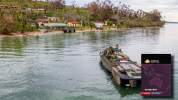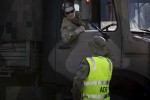Search
Using the filters to the left, click your selection, it will become bold and filter the results, click it again to remove that filter.
The content in this article is an extract of Spotlight Brief 7/21 . Global Networks 2030: Developing Economies and Emerging Technologies Centre for Strategic and International Studies – Mar 2021 Strategic competition in global communications is intensifying. the Centre for Strategic and International Studies has produced this report to help policymakers chart a strategic course regarding developing economies and emerging communications technologies. Hillman and Rivas core contention is that the United …

The content in this article is an extract of Spotlight Brief 6/21 . Global Networks 2030: Developing Economies and Emerging Technologies Centre for Strategic and International Studies – Mar 2021 Strategic competition in global communications is intensifying. CSIS has produced this report to help policymakers chart a strategic course regarding developing economies and emerging communications technologies. Hillman and Rivas core contention is that the United States and its allies must look ahead and …

The Effects of International Sanctions on Iran’s Military Spending: A Synthetic Control Analysis Defence and Peace Economics – Jul 21 Geoeconomics – the use of economic levers for strategic ends – is a reinvigorated topic in a time of strategic competition. In recent years, there has been an increasing interest in the effectiveness of sanctions for changing the political behaviour of targeted states, particularly due to the rise of grey-zone economic tactics. Here, Mohammad Reza Farzanegan investigates …

Improving supply chain resilience through preparedness Source: Security Challenges – Oct 20 Increasingly discussed prior to 2020, COVID-19 brought Australia’s vulnerability to trade disruption into stark reality. Until recently, there has been little from a Departmental (any Department) or overall Government side that has sought to understand our supply chain vulnerabilities and potential mitigation. The disruption of supply chains due to the pandemic has highlighted how these failures exacerbate security …

The economy is going through its most significant economic crisis since the Great Depression, nearly 90 years ago. This crisis has exposed the Australian economy’s structural weaknesses, and consequently, brought the issue of the military’s own long-term financial resilience into focus. From the military’s perspective, the relevant question is ‘ what comes next ’. Specifically, the military needs to confront two critically important questions: How will this ongoing economic crisis impact the military’s own …

This blog is part two of a two part series discussing the economic impacts on Defence in the wake of the ongoing COVID-19 pandemic. Part One of this two-part series focussed on cost implications of a large currency depreciation for the military. It showed how these can increase the cost of maintaining capability at an increasing rate, and force difficult choices relating to allocation of scarce resources. Part Two will now focus on the most important economic implication of the Covid-19 crisis for the …

This blog is part one of a two part series discussing the economic impacts on Defence in the wake of the ongoing COVID-19 pandemic The ongoing COVID-19 pandemic has already upended everyday life and work around the world. Following the lead of major stock markets overseas, the Australian stock market fell precipitously in less than two months. Additionally, in less than a month, the Australian dollar fell to its lowest level against the US dollar in the last 17 years. This exceeds anything …

